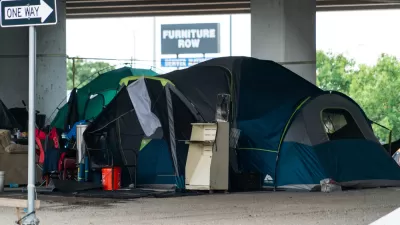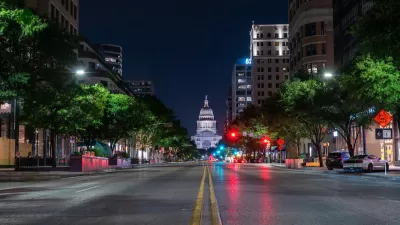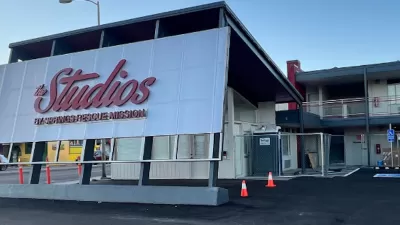The city is using the redistributed money to purchase hotels for permanent housing and provide supportive services.

Austin has purchased the first of what the city council hopes will be many hotels to be used as permanent housing for people who were previously unhoused, reports Alissa Walker for Curbed. The $6.5 million in funding for the project comes as part of a $20 million package that was recently redistributed from Austin's police budget as part of an experiment in reallocating police funding to social services.
"In addition to funding housing, including a new shelter to protect families facing domestic violence, the reconfigured budget proposes a plan to replace police officers with social workers to respond to nonviolent 911 calls, meaning the people who are the first point of contact for unhoused residents will be armed with mental-health training and access to shelter beds instead of guns," writes Walker. Councilmember Greg Casar emphasized the link between homelessness and police funding, citing the ineffectiveness of criminalizing the unhoused instead of funding supportive programs. "We know that policing and jails doesn’t solve homelessness. Housing does," he said.
Opponents of the plan are fighting back with a ban on public camping likely headed to the next state ballot and threats of a statewide anti-camping ordinance from Texas Governor Greg Abbott. If passed, such legislation would make life even more difficult for people experiencing homelessness.
FULL STORY: Austin Experiments With Moving Police Dollars to Homeless Housing

Study: Maui’s Plan to Convert Vacation Rentals to Long-Term Housing Could Cause Nearly $1 Billion Economic Loss
The plan would reduce visitor accommodation by 25,% resulting in 1,900 jobs lost.

North Texas Transit Leaders Tout Benefits of TOD for Growing Region
At a summit focused on transit-oriented development, policymakers discussed how North Texas’ expanded light rail system can serve as a tool for economic growth.

Why Should We Subsidize Public Transportation?
Many public transit agencies face financial stress due to rising costs, declining fare revenue, and declining subsidies. Transit advocates must provide a strong business case for increasing public transit funding.

How Community Science Connects People, Parks, and Biodiversity
Community science engages people of all backgrounds in documenting local biodiversity, strengthening connections to nature, and contributing to global efforts like the City Nature Challenge to build a more inclusive and resilient future.

Alabama: Trump Terminates Settlements for Black Communities Harmed By Raw Sewage
Trump deemed the landmark civil rights agreement “illegal DEI and environmental justice policy.”

Dear Tesla Driver: “It’s not You, It’s Him.”
Amidst a booming bumper sticker industry, one writer offers solace to those asking, “Does this car make me look fascist?”
Urban Design for Planners 1: Software Tools
This six-course series explores essential urban design concepts using open source software and equips planners with the tools they need to participate fully in the urban design process.
Planning for Universal Design
Learn the tools for implementing Universal Design in planning regulations.
City of Santa Clarita
Ascent Environmental
Institute for Housing and Urban Development Studies (IHS)
City of Grandview
Harvard GSD Executive Education
Toledo-Lucas County Plan Commissions
Salt Lake City
NYU Wagner Graduate School of Public Service





























